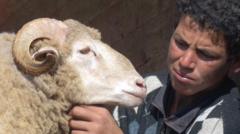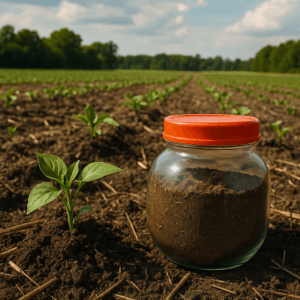In a significant public address, King Mohammed VI of Morocco has urged citizens to reconsider the sacrificial rite of Eid al-Adha at a time when the country's sheep population has dwindled by approximately 38% over the past decade, largely due to ongoing drought conditions.
Moroccan King Urges Caution as Sheep Shortage Affects Eid Celebrations

Moroccan King Urges Caution as Sheep Shortage Affects Eid Celebrations
King Mohammed VI advises Moroccans against traditional sheep sacrifice for Eid al-Adha due to drastic herd declines.
The king's call for restraint comes ahead of Eid al-Adha, a pivotal Islamic celebration occurring in June that commemorates the willingness of Prophet Ibrahim, or Abraham, to sacrifice his son in obedience to God. In celebration, Muslims typically slaughter sheep or other livestock, distributing the meat among family and the less fortunate. However, with the Moroccan herd severely affected by years of drought, the king emphasized that proceeding with the ritual could adversely impact numerous families, especially those already facing financial hardship.
"Under these difficult circumstances, performing the rite will cause significant harm to large segments of our people," he stated, in remarks delivered by the Minister of Religious Affairs on state television. His appeal echoes a similar plea by his father, King Hassan II, during a significant drought in 1966.
Morocco's Agriculture Minister, Ahmed Bouari, shed light on the agricultural struggles the country faces, attributing the plight to stringent water usage policies prioritizing vital sectors such as transport and industry. He noted the immense impact on farming practices, causing rigorous water rationing and affecting irrigation.
With meat prices surging, the government has opted to import 100,000 sheep from Australia to help mitigate shortages, alongside lifting import taxes and VAT on livestock and red meat. This move aims to stabilize prices for consumers amid the crisis.
"Under these difficult circumstances, performing the rite will cause significant harm to large segments of our people," he stated, in remarks delivered by the Minister of Religious Affairs on state television. His appeal echoes a similar plea by his father, King Hassan II, during a significant drought in 1966.
Morocco's Agriculture Minister, Ahmed Bouari, shed light on the agricultural struggles the country faces, attributing the plight to stringent water usage policies prioritizing vital sectors such as transport and industry. He noted the immense impact on farming practices, causing rigorous water rationing and affecting irrigation.
With meat prices surging, the government has opted to import 100,000 sheep from Australia to help mitigate shortages, alongside lifting import taxes and VAT on livestock and red meat. This move aims to stabilize prices for consumers amid the crisis.






















